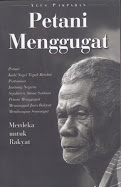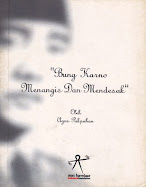The Jakarta Post , Jakarta | Thu, 08/02/2007 12:26 PM | Opinion
Agus Pakpahan, Jakarta
It is not only historical or political classifications of people on earth that divide nations or people into two categories, namely developed and developing countries. In fact, what we now call developing countries were termed ""third world"" countries in the past. It is implied by itself in that terminology that our culture is a third rate culture. This status had been given by developed nations and we consciously or unconsciously accepted such a label.
Entering the end of the 20th century, nations in the third world, especially in East Asia, showed a tremendous change in their economic development. Again, the developed nations called such positive trend the ""Asian Miracle"". It was showed that what had been reached by East Asian countries was only a miracle, namely the economic progress was achieved not as a result of intelligence and hard work but was the result of a power beyond people's capabilities. Again, we were happy with such assessment
Developed countries with 500 years of ""high"" culture see East Asian countries' economic progress as a challenge or a threat to them. Asian values have been deeply studied and have been seen as the cause behind such rapid progress in socio-economic development. The consistent high economic growth experienced by China, which has reached more than two digits, is no longer viewed as a miracle but as a result of China's strategy in coping with the globalization process.
If we view the basic foundations of socio-economic development is societal values then we will be able to see that there are some truths in the positive aspects of Asian values that may have their roots in Chinese culture.
The root is the Chinese way of seeing the world. They see their culture as not inferior to other nations' cultures. The Koreans and the Japanese adopted the same attitude towards their cultures. We are not talking about cultural superiority. What I mean here is that a strategy of economic development should be seen as cultural strategy, namely the strategy that takes benefits from people' ways of thinking, feeling and believing. The basic argument is that what people can be or can do is rooted in what they believe, feel and think. This is part of the culture.
We have our own ways of belief, feeling and thinking but through our colonial history we have been ""educated"" to think that our culture, our ways of thinking, feeling and believing are inferior. We have been told and taught that the right way to develop our welfare or nation is to follow what has been experienced in Western nations.
As a result, we cannot know which one is suitable for us and which one is not. So our minds are confused. We think that changing from rice to wheat is better to do and that by doing that we feel we are becoming a part of the modern nations. We perceive that privatization is the only right strategy to build up the business sector and we do not realize that the real issue behind privatization or selling our assets to foreigners is that we are not able to apply the best use of our resources ourselves.
The basic problem is not in the resources we want to sell but lies in our lack of capability. Therefore, the best solution is not selling our strategic resources but to develop our capabilities -- what we can be and can do. Tata India, for example, has chosen the opposite strategy, namely buying Tetley, a British tea company, as a symbol of a winning strategy. Tata bought Tetley not because it had excess money, but because it has the best people in tea. This is a culture-based strategy that is incorporating societal values into business and practices.
The statement of The World Is Flat (Friedman, 2005) is similar to the message of behind ""Asian Miracles"" and third world nations, namely, Friedman is putting a new label on the world we share together. It means that all the space on this globe has been conquered by the developed nations. Or, it means that globalization has made the whole world belong to the developed nations.
In other words, the developed nations have been successful in making a one-world culture -- the global way of thinking, feeling and believing that is dictated by the developed nations. It is a realization of what Isaiah Berlin said, that freedom for the pike is death for the minnow. Or, in this case, our culture.
The last statement can be viewed as an exaggeration. But, it could be possible if there is no awareness of all nations on this earth to protect or to care for our cultural diversities. The sustainability of people in this globe will be determined by our success in preserving the world's cultural diversities in a positive sense.
The teak and the oak ""live, think, and believe"" in their own ways. Tata, for example, is the teak that can make the best use of tea that grows in tropical regions. Malaysia, China or Japan had found their own ""teak"". Their ideology is one: Living together independently in nature but mutually in nurture. This is the requirement for sustainable peace and growing welfare.
As mankind, can we imitate the oak and the teak?
The writer is an agricultural economist who specializes in natural resources and institutional economics. He can be reached at ciboerial@yahoo.com.











Tidak ada komentar:
Posting Komentar